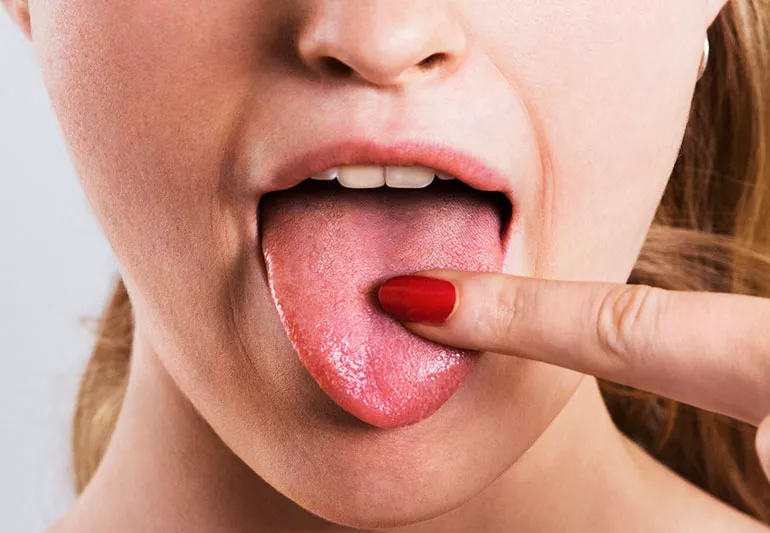A bad taste in your mouth may be the symptom of something harmless or something serious.
Whether it’s a bitter, sour, metallic, or sweet taste the reasons behind it could be numerous.
That is why it’s a good idea to review what you’ve been eating over the past days, how you’ve been feeling, and sometimes even get to know your family’s medical history.
We will guide you into some of the causes that may be responsible for the bad taste in your mouth.
1. You could have a yeast infection.
It’s also called oral thrush, and it affects the mouth, creating white spots on the throat and tongue.
The infection is caused by a bacteria called Candida Albicans that naturally inhabits your mouth and is controlled by your immune system.
However, if your immune system weakens, this bacteria can quickly reproduce causing an infection.
Apart from the bits of white on your throat, another symptom of this is a weird taste in your mouth.
2. You could be pregnant.
Apart from nausea and fatigue, a vast proportion of pregnant women complain about a metallic taste in their mouths.
This happens because of the hormonal changes that your body experiences when creating new life.
Hormones can affect your sense of smell and taste, causing you to hate your former favorite perfume and ache for Brussel’s sprouts.
But don’t worry, this usually goes away in the third trimester.
3. You could need more zinc.
If you’re eating a low-zinc diet, your body is not absorbing a proper amount of zinc, or you have a zinc deficiency, you may experience an odd taste in your mouth and scientists are still trying to figure out why.
After this study, they believe it’s because zinc elevates the levels of gustin, a type of protein that controls taste buds.
4. It could be because of the flu or a regular cold.
If you have a bitter taste on your tongue, accompanied by the flu or a cold, don’t worry, this is totally normal.
Both are common infections and, according to scientists, they make your immune system alert and ready to fight them off with protein production. W
hile this is going on, it may leave a bittersweet taste in your mouth.
Plus, if the infection is in your nose or throat, you may be experiencing an odd taste because of the bacteria that causes the flu.
5. It could be diabetes.
If your body is having difficulties regulating sugar in your blood you may experience a strange sweet taste in your mouth.
Research shows that this is the reason why, if you suffer from diabetes, you experience this.
Another reason is that sometimes diabetes may lower the amount of zinc you absorb, making your mouth feel like it ate something bittersweet.
6. It could be the pine nuts you ate a few days ago.
Scientists are still trying to figure what causes “pine nut syndrome” which refers to the bitter taste some people experience a few days after eating pine nuts.
It can last for a couple of days up to a couple of weeks, and it gets stronger with every meal or drink you ingest.
You might not sense a strange flavor when you eat them, but that doesn’t mean you won’t get the syndrome.
And there’s nothing to worry about since, other than that, there are no further side effects.
7. Your stress levels could be too high.
Anxiety can cause what is known as xerostomia or dry mouth which means exactly that, the effect of dryness caused by low amounts of saliva in your mouth.
Saliva plays an important role in our health from the beginning of our digestion to fighting bad bacteria in our mouth.
So if you don’t produce it in the necessary amounts, you’ll experience a weird taste.
When you’re nervous, worried, or are anxious, you tend to produce less saliva which is the explanation for that odd taste.
8. It could be the medication you’re taking.
If you’re taking a specific type of medication, you may have experienced a bittersweet, salty, or even metallic taste in your mouth.
However, as studies explain, this is a side effect of many medicines, prescribed or purchased over-the-counter like antibiotics, anti-inflammatories, and those used to treat hypertension and allergies. Even some multivitamins can have this effect.
Luckily, it only lasts until you process the medicine or supplement.
9. Your oral hygiene may need to be improved.
Your mouth is home to many types of bacteria, good and bad.
If you don’t have proper oral hygiene by brushing your teeth and flossing daily, you will allow harmful bacteria to proliferate, which will lead to a suspicious taste.
In addition to a strange taste, you could have issues with your teeth and gums, which would only make matters worse.
It’s always a good idea to go to the dentist at least every 6 months and follow your doctor’s recommendations.
Have you ever experienced a weird, unexplainable taste in your mouth?
What did you do to make it go away? Leave your advice in the comment section!
Source: Bright Side


